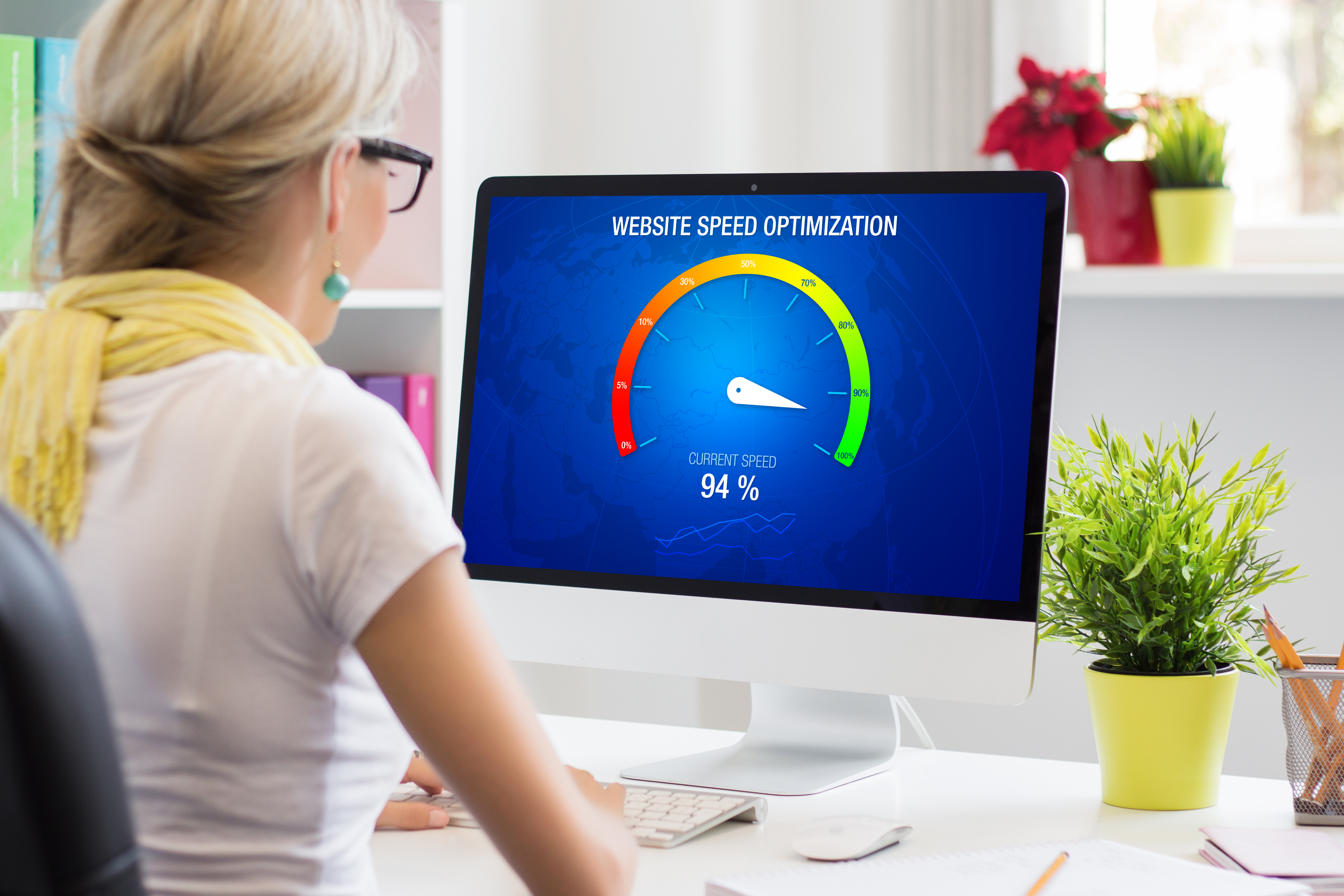Boost Your Website's Performance with Speed Tests
I am a creative and analytical person who enjoys problem-solving and finding creative solutions. I am driven by curiosity and a passion for learning, and take initiative to explore and understand new concepts. I am a great communicator and collaborate well with others, and am always looking for opportunities to improve myself and my team.
Boost Your Website's Performance with Speed Tests
As a seasoned SEO expert, I understand that the speed of your website is not just a matter of convenience for your visitors—it's a key factor that can make or break your online presence. Fast-loading websites not only deliver a superior user experience, but they also receive a favorable tick from search engines like Google, boosting your SEO rankings. Your website speed can be the difference between a customer who stays and explores or a visitor who exits swiftly, taking potential business with them.
 Why Does Website Speed Matter?
Why Does Website Speed Matter?
Website speed is the first impression you make on your potential customer or client. A speedy and responsive site shows you care about user experience, appreciate your audience’s time, and run a professional, reliable business. From a technical perspective, faster websites are not only preferred by users, they're a key criterion in SEO rankings. Google and other search engines analyze website loading times and use this factor when determining their rankings.
Assessing Your Website's Speed: An Introduction to Speed Testing Tools
Understanding the need for speed is the first step, but how do you determine the exact speed of your website? That's where website speed testing tools like GTmetrix, WebPageTest, and Google PageSpeed Insights come into play. These invaluable tools allow you to test your website’s speed and identify any potential issues that may be keeping your site from achieving top speed. In this post, I'll show you how to use these tools effectively to boost your website's performance and improve your SEO rankings.
Understanding Website Speed
What exactly is Website Speed?
Website speed, often referred to as “site speed” or “page load speed,” is a measure that outlines how quickly a webpage loads onto a user's device. It scores the performance of various elements such as how fast the text appears, how quickly the pictures load, and how soon a user can interact with the page. A fast website not only makes for great user experience, but is also beneficial for SEO.
Why does Website Speed Matter?
Website speed is not just about keeping impatient users happy; it's also an integral part of SEO rankings. Search engines like Google place a significant emphasis on site speed when ranking websites. Faster-loading websites offer a better overall user experience, which search engines reward with higher rankings. This means that if your website loads quickly, it will be more likely to rank higher in search engine results, attracting more organic traffic to your site.
The Impact of Website Speed on Conversion Rates and Bounce Rates
Website speed is directly linked to your website's bounce rate and conversion rate. A high loading speed reduces the bounce rate and increases the conversion rate. If your site takes too long to load, visitors are more likely to leave or "bounce," hence leading to a higher bounce rate. On the other hand, a fast website creates a pleasant user experience, encouraging them to stay longer, browse more pages, and ultimately make a purchase or conversion.
To put it simply, a slow website is a silent killer of online businesses. It can turn away potential customers, affecting your bottom line. Therefore, optimizing your website's speed is not just an option, but a prerequisite for the success of your online venture.
 Dealing with Slow Website Speed
Dealing with Slow Website Speed
Identifying the Factors That Slow Down Website Speed
Several factors can contribute to slowing down your website speed. These include server performance, the size and quality of your images, the amount of traffic your website handles, out-of-date website code, poorly-written code, and a plethora of plugins or embedded media. Understanding these elements is your first step towards improving your website's load speed.
Tips on How to Improve Website Speed
Improving website speed can seem a daunting task, but a few adjustments can make a significant difference:
- Optimize Images: Make sure that the images you use are properly formatted and compressed. High-resolution images might look appealing, but they can significantly reduce your website’s speed.
- Consider Your Hosting Options: Not all hosting options are created equal. Your site’s speed largely depends on the hosting plan you choose.
- Limit Plugins: Too many plugins or widgets can slow down your page load times. It’s better to keep them to a minimum and only use the ones which are necessary.
- Minimize HTTP Requests: The more components your website has (scripts, images, CSS files), the more HTTP requests are made, which can slow down your site. Try to minimize these by streamlining the number of elements on your page.
- Use Browser Caching: Caching stores cache versions of static resources, which reduces the server lag.
By understanding what slows down your site and employing the tips above, you can vastly improve your website speed, creating a better experience for your users and boosting your SEO rankings.
Introduction to Website Speed Test Tools
The Concept and Importance of Speed Test Tools
A website speed test tool is a utility that aids in measuring the performance of a website. It accomplishes this by quantifying the time it takes to download the internet content of a domain to a browser. These tools not only provide an accurate measure of your website's speed but also offer insights about aspects of your site that might be slowing it down.
Speed testing holds paramount significance as it assists in identifying performance bottlenecks. It's crucial for ensuring that you provide the best possible experience to your visitors, along with keeping up with SEO benchmarks set by search engines.
Overview of GTmetrix, WebPageTest, and Google PageSpeed Insights
Several tools can assist you with website speed testing, but three that stand out are GTmetrix, WebPageTest, and Google PageSpeed insights.
GTmetrix is a powerful tool that provides detailed insights into your website's speed performance by giving you actionable recommendations on how speed can be improved.
WebPageTest is an open-source tool that conducts a free website speed test from multiple locations around the world, using real browsers at real consumer connection speeds.
Google PageSpeed Insights is a comprehensive platform by Google that gives you real-time information about the speed of your website on both desktop and mobile devices and offers suggestions on how to enhance your site speed.
In the next sections, we will discuss each of these tools in detail, including how to use them effectively to maximize your website's speed performance.
Using GTmetrix for Website Speed Test
An Introduction to GTmetrix
GTmetrix is a comprehensive and user-friendly tool that provides in-depth analysis of your website's loading speed and performance. Going beyond indicating how fast your website loads, GTmetrix provides insights on the various elements affecting your site's speed, along with actionable recommendations on how to optimize them. This extends to nearly all aspects of your webpage including images, videos, text, scripts, and more.
A Step-by-Step Guide to Using GTmetrix
Using GTmetrix is a straightforward process:
- Visit the GTmetrix website and sign up for a free account.
- On the dashboard, enter your website URL in the 'Enter URL to Analyze' box.
- Click 'Analyze' and wait for the tool to run a check on your website.
- Once done, GTmetrix will provide a comprehensive report detailing your website's speed, total page size, and a slew of other metrics and recommendations for improvements.
Case Study: The Benefits of GTmetrix
Let's look at an example of how GTmetrix can improve website speed. Company X was struggling with high bounce rates and low conversion rates due to a slow-loading website. Upon analyzing their site with GTmetrix, they discovered that most of their images weren't properly optimized, leading to slow loading times.
By following GTmetrix's recommendations and optimizing their images, the company was able to reduce their website's load time from 8 seconds to 3 seconds. This directly resulted in an improved user experience, leading to lower bounce rates and higher conversion rates.
This case study emphasizes how a simple and free tool like GTmetrix can offer invaluable insights and actionable recommendations, significantly improving your site's speed and overall performance in a relatively short time.
Utilizing WebPageTest for Website Speed Analysis
An Overview of WebPageTest
WebPageTest is a well-known, open-source platform used to measure and analyze the performance of web pages. It is particularly useful as it tests your website's speed from multiple locations and under different conditions to imitate the real-world user experience. It gives insights into various metrics such as speed index, time to first byte, and fully loaded time, providing an in-depth understanding of what is hindering your website from loading quickly.
Tutorial on Using WebPageTest for Speed Analysis
Conducting a speed analysis using WebPageTest involves the following steps:
- Visit the WebPageTest website.
- Enter your website's URL in the 'Enter URL to test' box on the homepage.
- Select the test location and the browser you want to test your page on.
- Click on the 'Start Test' button. The tool will then test your website from the selected location, providing comprehensive results.
Advantages of Using WebPageTest
WebPageTest has several advantages that make it a go-to choice for website speed analysis:
- It allows you to test your website under various real-world conditions, taking location, browser type, and speed of connection into account.
- It provides detailed, easy-to-understand results that help pinpoint exactly what is causing your site to load slowly.
- It allows you to make side-by-side comparisons of different pages or competitors, for more in-depth analysis.
- As an open-source tool, it's available free of charge, making it accessible for large and small businesses alike.
By leveraging these benefits, WebPageTest can provide crucial insights to better understand your website's performance and make necessary improvements that boost speed and enhance the user experience.
Leveraging Google PageSpeed Insights for Website Speed Optimization
About Google PageSpeed Insights
Google PageSpeed Insights is a robust tool offered by Google that’s designed to analyze the content of a webpage and then generate suggestions to make it faster. It gives you valuable feedback on both mobile and desktop versions of your website, and its scoring system helps users understand if their site speed ranks as poor, needs improvement, or is considered good.
Steps on Using Google PageSpeed Insights
Using Google PageSpeed Insights is simple and straightforward. Here’s a step-by-step guide on how to use it:
- Visit the Google PageSpeed Insights page.
- Enter your website's URL in the field provided.
- Click 'Analyze'.
- After a few seconds, you will receive a report that includes your website’s speed score and optimization suggestions.
Case Study: Optimizing Website Speed with Google PageSpeed Insights
To illustrate the practical implications of Google PageSpeed Insights, let's consider the journey of an e-commerce site 'Shop-n-Bag'. Initially, the website experienced slow loading times that resulted in high bounce rates and subsequent loss of sales.
They then decided to employ Google PageSpeed Insights to investigate their website's performance. The results highlighted several critical issues, like render-blocking resources and unoptimized critical CSS.
Upon addressing these issues and applying the suggested fixes, Shop-n-Bag improved their website loading speed dramatically, enhancing the customer experience and leading to an increase in session duration, lower bounce rates, and higher conversion rates.
Through this case study, it becomes clear how Google PageSpeed Insights' recommendations can provide a roadmap to effective website speed optimization, delivering tangible business results.
Comparing GTmetrix, WebPageTest, and Google PageSpeed Insights
Strengths and Limitations
GTmetrix
- Strengths: In-depth recommendations for improvement, ability to test from different locations, and an easy-to-understand grading system.
- Limitations: Some advanced features require a paid plan, and recommendations can sometimes be technical, needing expert understanding.
WebPageTest
- Strengths: Provides various testing conditions, including connection type and location. It also offers an advanced video capture feature, providing a visual representation of how your site loads.
- Limitations: The interface is not as user-friendly as other tools, and the results can be quite technical.
Google PageSpeed Insights
- Strengths: Provides real-time data, mobile and desktop testing, easy to use, and it's comprehensive in its overall speed performance insights. Its integration with other Google products can be an advantage for those using Google Analytics or similar tools.
- Limitations: It doesn't offer location-specific testing and doesn't provide as much detail as some other tools regarding specific page elements.
Comparative Analysis of Functions and Performance
All three tools offer unique advantages and pack a punch. GTmetrix shines when it comes to delivering an actionable list of improvements based on loading timings and priorities. WebPageTest allows more specific testing conditions and gives a very tactical view of what to improve.
Google PageSpeed Insights stands out for its real-time data, comprehensive measurements, and intuitive score ranking system. Also, because Google PageSpeed Insights is a Google tool, its measurements are believed to closely reflect those that might affect a website's Google search ranking.
In conclusion, using a combination of these tools would offer the most comprehensive analysis and the best opportunity to hone your site's performance. Each of these tools complements the others and, when used together, can offer an effective strategy for website speed optimization.
Tips for Maximum Utilization of Website Speed Test Tools
Making the Most of These Speed Test Tools
- Consistency: Run tests regularly and under identical conditions so that your comparative results are reliable.
- Analyzing Comprehensive Data: Don’t just focus on the final score. It's essential to delve into the specifics of what is being measured and how they impact your overall performance.
- Test on Different Devices: Conduct tests for both mobile and desktop versions of your website as these may vary significantly.
Advanced Strategies and Tips
- Tackle Major Issues First: Once you've run a speed test, you'll likely have a list of areas for improvement. Prioritize based on what can significantly impact speed. Often this might be large file sizes, unnecessary JavaScript, or render-blocking content.
- Re-Test After Making Changes: Once you've implemented changes, re-test to measure the impact of your changes and ensure they've had a positive one.
- Utilize All Three Tools: Don't just rely on one tool as each provides slightly different insights. By using all three, you'll get the most comprehensive analysis.
- Optimize Based on Different Network Conditions: With tools like WebPageTest, you can set your tests to mimic slower network conditions. This will give you a better idea of your site performance for users with slower internet connections.
Remember, the point of these tools is not to drive yourself to attain the perfect score but to help you understand what might be causing slow load times and providing you with a roadmap to make improvements. A faster website leads to better user experience, increased conversions, and better SEO performance, which all contribute to achieving your business objectives.



.jpg)
.jpg)

.jpg)
.jpg_nowm_1260.jpg)